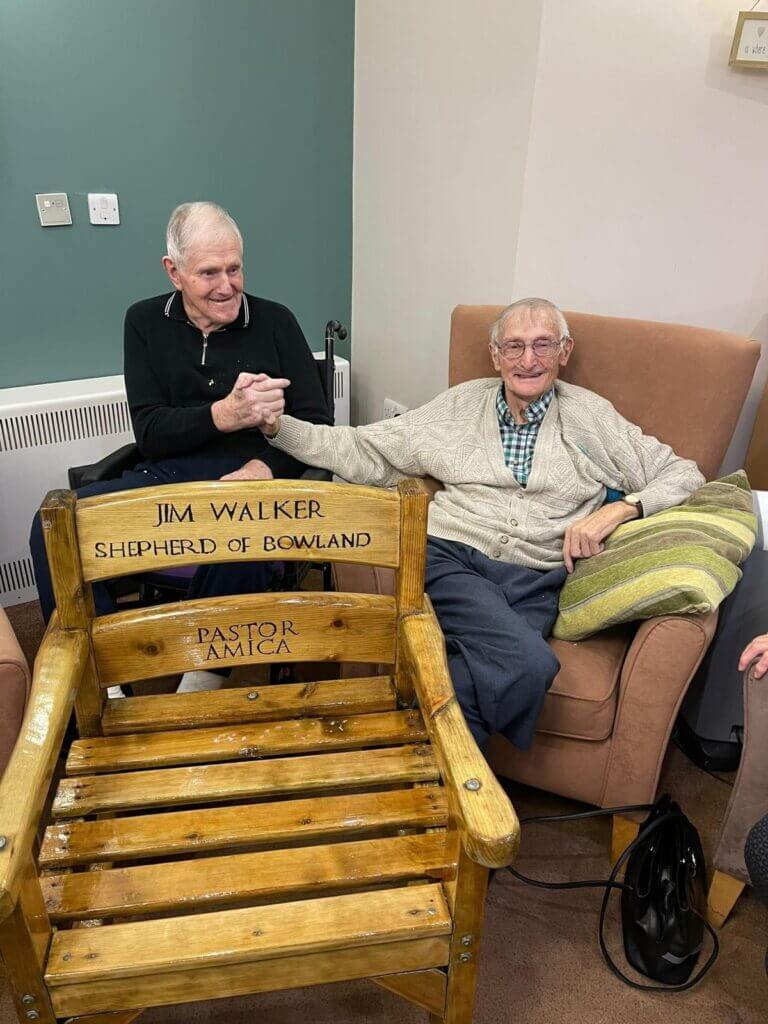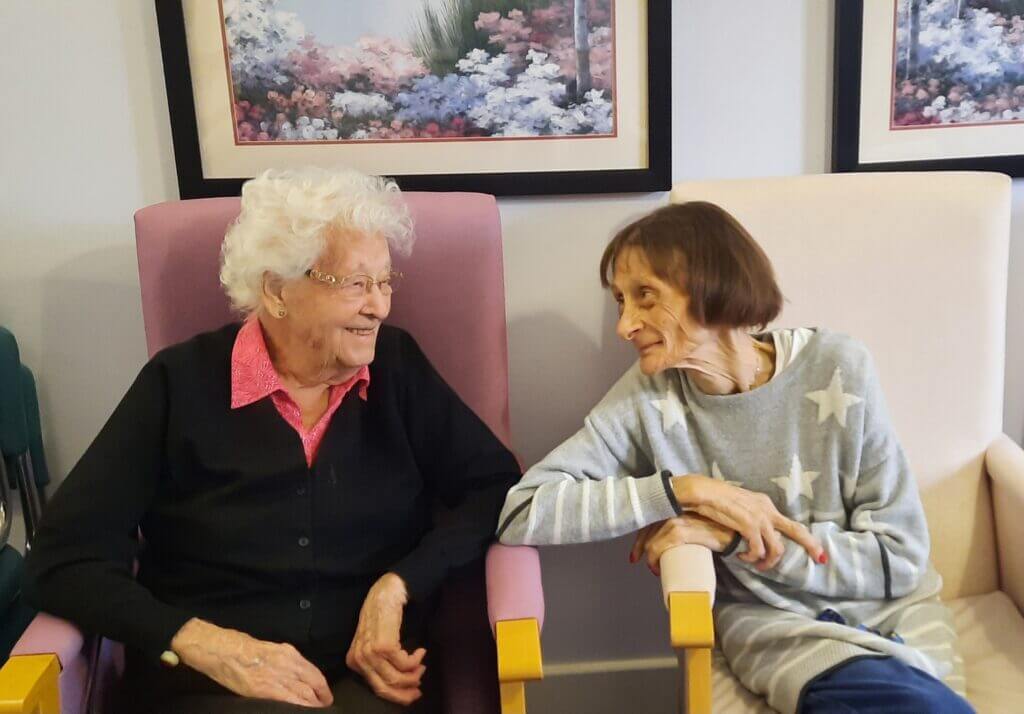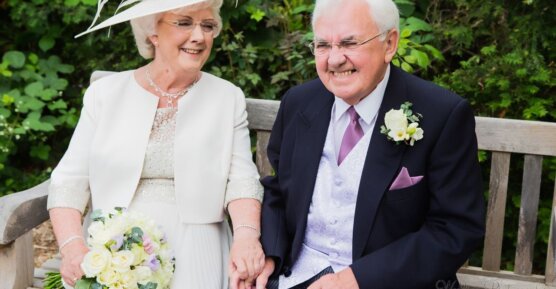
Page contents
The many benefits of having good friends in our lives are no secret. Friends are there to cheer us on, celebrate our successes and help us through challenging times. However, many circumstances in life can lead to us losing contact with our friends, including moving to a care home.
Research has shown that older people living in a care home are twice as likely to feel lonely as older people living in the community, and with almost half a million people living in care homes in the UK, this is a worrying statistic.
Making friends can be difficult at any stage of life, and it can be even more daunting as we get older, but there are many different ways to get to know people and build friendships in a care home.
So whether you’re about to move to a care home yourself, or are wanting to help a loved one to socialise, we have gathered some advice for building friendships in a residential setting.
Make the most of resident events and activities
All care homes should offer a variety of activities for residents to take part in. What’s on offer will vary between different settings, but there should be things to suit every resident.
Activities could include:
- Exercise classes
- Arts & crafts
- Visiting pets
- Gardening
- Book clubs
- Cooking
- Games nights
- Quizzes
Whilst everything on offer may not be your idea of fun, there will hopefully be one or two things that spark your interest and that you’d like to join in with.
Actively involving yourself in these events will give you the opportunity to engage with other residents, and with there being a focus of the time spent together, conversation should come easier. It’s also likely that you’ll find yourself with people who have similar interests to you, which always helps to promote a bond.
George & Jim
Jim Walker and George Holder originally met over fifty years ago and struck up a friendship.
George was a keen walker and was leading a group of walkers through Jim’s sheep farm. Over the years, Jim would regularly see George leading a group of walkers through the valley and would lean over the farm gate for a chat.
By fate, they now live next door but one to each other in Longridge Hall Care Home, a residential, dementia residential and short-term respite care home in Preston, and have rekindled their friendship.
George, 95, who is a talented furniture maker by trade, wanted to let Jim, 87, know how much his friendships meant to him, so he worked alongside Craig Ward, the home’s maintenance operator, spending hours restoring a weather beaten, wooden chair to present as a surprise gift to Jim.
He also painstakingly carved the inscription ‘Jim Walker, Shepherd of Bowland’ into the wood, and added the Latin inscription ‘Pastor Amica’, which means ‘gentle shepherd’.

George presented Jim with the chair during a recent event at the home and asked Craig to read out a moving speech he had prepared.
Craig said: “It has been incredible working in secret with George on this project. Whenever I’ve had some spare time, I’ve collected him from his room and we’ve worked together on the chair.
“It was George’s idea to design the chair and I sanded down the chair and varnished it while he did all the intricate work and chiselled the wording. He has fond memories of walking along Hadrian’s Wall in Northumberland so the lettering is inspired by the original Hadrian typeface. Another resident, Ron Hudson, helped by painting all the lettering in black paint.
“It was a big surprise and incredibly moving when George presented Jim with the chair in front of all the residents and George’s daughter, Jean. Everyone was amazed and we all had tears in our eyes. It was just so wonderful to see two good pals honouring a 50-year friendship.
“The chair is now in pride of place in Jim’s room and everyone comments on it when they pop in to chat to him.”
Tracey Hartley, manager of Longridge Hall Care Home, said: “We have such a strong sense of community in the home and the friendship between Jim and George really epitomises this.”
Eat meals in the dining area or other social spaces
Mealtimes are a perfect place for socialising. Food gives a common point of interest and there is a natural end to the occasion if you’d like to limit your social time whilst you’re just getting to know people.
If you’re not ready to sit and have a meal with others, or if you are unable to for health reasons, you could sit and have a drink or a snack in the other social spaces instead, such as the living area or the garden, when the weather allows. Some care homes also have an on-site café or bar which offer a perfect place to spend time with your fellow residents.
Find compatible interests
All good friendships are based on some kind of common ground. This could be growing up in similar areas or having similar upbringings, sharing a profession, enjoying the same hobbies or even simply having a shared love for a drink in the pub.
It’s these commonalities that usually ignite the initial bond with another person, so finding the things you have in common with others will help to lay some solid foundations.
Communicate with staff
As well as being there to provide care, the team working in a care home are also there to support your wellbeing and help you to enjoy your quality of life.
If you would like opportunities to mix with other residents, it’s a good idea to let staff know. They will be able to offer whatever support you need, whether that be introducing you to residents you have similarities to or making arrangements for any additional support you need to socialise.
Many care homes also have a Resident Ambassador. They will take on the role of welcoming new residents and helping them to settle into the home. A Resident Ambassador will be able to introduce you to others or let you know what’s going on, helping you to get more involved with life at the home.
Pat & Suzanne
Despite their 30 year age gap, Pat and Suzanne have built a fabulous friendship since first meeting when Suzanne moved into Drewery House, Rapport Housing & Care’s former supported home in Wigmore.

Suzanne revealed:
“When I moved in, Pat already lived there and she made me feel so welcome. I just knew from the moment I met her that there was something I loved about her.”
Shortly after moving, Suzanne was offered residency at Watling Court, an Extra Care Housing Scheme in Gravesend. Not wanting to lose her friend, she encouraged Pat to move too, who was then offered the apartment just above Suzanne’s.
Throughout the pandemic, the pair were a great support for one another, and despite needing to isolate and not see much of each other, the pair continued to build on their friendship by supporting one another in different ways.
She added:
“Pat’s family are in Canada and Spain, so I do look out for her, I feel privileged that they trust me to help her with her appointments and things like that.
“I’ve had my struggles too, but Pat has always been there for me, she listens and really helps me when my head is muddled.”
Speaking on how they maintain their friendship, Pat says:
“I don’t always say much but I do listen. Like all best friends we fall out sometimes, but we always talk it through. I can’t put it in to words how much I need Suzanne.”
Living in a care home should be more than receiving care. The whole team around you are there to help you to flourish, empower you to be as independent as possible and live a lifestyle that makes you happy.
If that’s whiling your days away with a cup of tea in the garden by yourself, then that’s absolutely your prerogative. But if you would like to socialise and make friends, there should be plenty of opportunities for you to do so, and remember that it’s never too late to make new friends.
“There are no strangers here; Only friends you haven’t met yet”.
William Butler Yeats
Some residents have even gone further than friendship and fallen in love in a care home. You can read Marion and Stuart Potter’s story here.
Find your ideal care home
- Explore a wide range of care options and facilities
- Read independent ratings and reviews
- Connect directly with care homes to book a tour and discuss your needs


